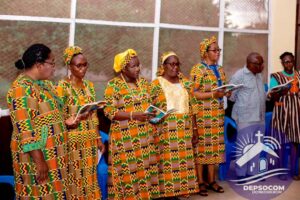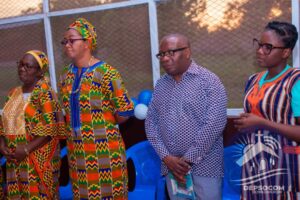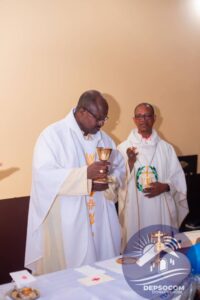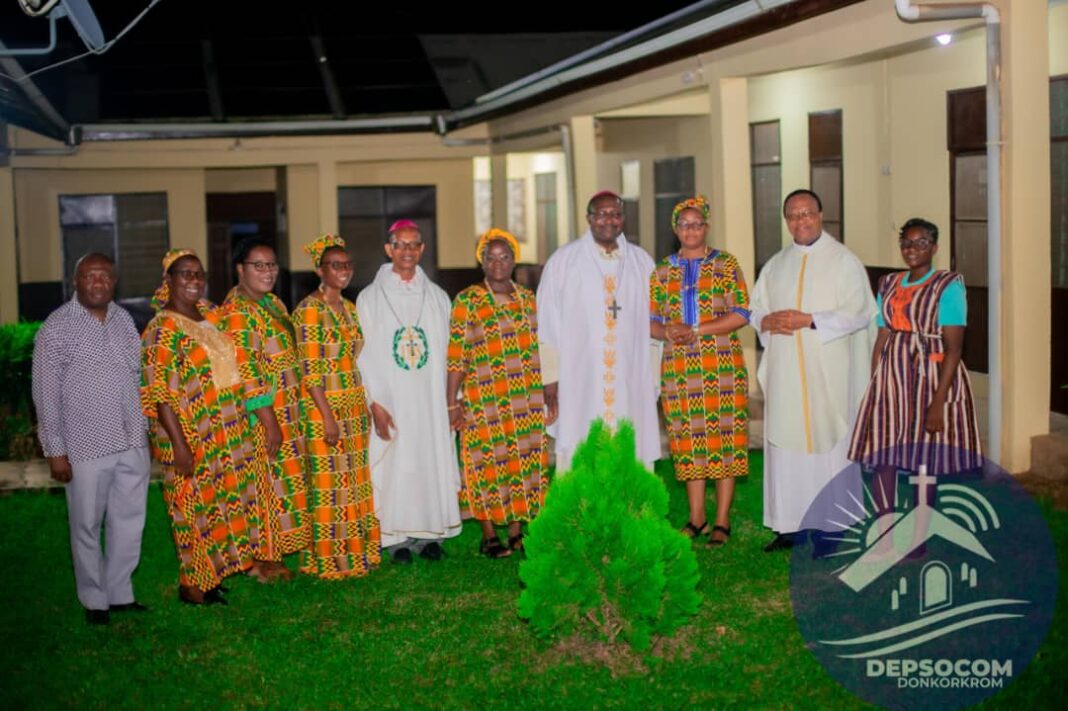October 7 which marks the Feast of the Most Holy Rosary has been celebrated this year at the Holy Rosary Sisters Convent in Donkorkrom, Kwahu Afram Plains North District in the Eastern Region of Ghana.
The Feast day Mass was graced by two Bishops: Most Rev. John Alphonse Asiedu, SVD, Vicar of the Apostolic Vicariate of Donkorkrom and Most Rev. Gabriel Edoe Kumordji, Bishop of Keta-Akatchi, and former Bishop of Donkorkrom, as chief celebrant.
Also present was Rev. Fr. Vitalis Azike, Education Secretary of the Catholic Diocese of Ekwulobia in Nigeria, Br. Samuel Dagadu, SVD, Financial Administrator of the Vicariate and Immaculee Tagali, an aspirant of the Holy Rosary Sisters, together with the Sisters.
Reflecting on the origin of the Holy Rosary, Bishop Kumordji noted that it came about in the year 1571, with St. Dominick de Guzman who shared that he had seen a vision and Mary was giving him a rosary, and by praying it, he was able to defeat all the bad teachings, the errors people were teaching in the Catholic Church.
According to his Lordship, the rosary was given to St. Dominick by Our Lady because he was fighting seriously against all the evils, which is a sign that “prayer can lead us to defeat error, lies, corruption, and everything,” he said.

He further explained how the Feast came to be on 7th October. According to him, in 1571, Pope Pius V had called on the Catholics to pray the rosary when Ottoman wanted to defeat Europe with Islam, and through the power of the Rosary, Ottoman was defeated on the 7th of October.
“Our rosary prayer can defeat everything; even wars,” he reiterated.
The Bishop urged the Sisters, whose proper Feast it was, to pray fervently and guard against the tempting thought that they can do it all by themselves, saying that “in our world today, many of us in the church think we can do it all by ourselves. Our priests and Religious have studied high with many certificates, and yet we are losing our people”.
He added that educational qualifications and work should not supersite the religious life of a Consecrated person, but rather a life rooted in prayer and total dependence on God, which will go a long way to enhance the work and the qualifications.
“Please I am not condemning certificates, but I think our religious life in the church must be very active. Don’t depend on the qualifications behind it. We have to rely on God the more,” he clarified.

Making reference to the First Reading of the day, where Jesus’ ‘confused’ disciples withdrew to the upper room to pray when their Master had been taken away, and the descending of the Holy Spirit upon them to commission them to go and bear fruits, the Bishop charged the Sisters to continue to pray constantly and together, because he believes it is because of their prayers that they have grown up to the stage they are now, and still it is through prayer that the Vicariate will continue to grow and “the prayer will bring out the best out of the people you are serving”.
Reflecting further on the second part of the Gospel with the verse “Let the children come to me,” the Bishop encouraged the Sisters, especially those of them in the school ministry to strive to make a difference so that anyone who encounters a child from Holy Rosary School will notice that he or she has been trained; not just intellectually but morally, spiritually and otherwise.
Bishop Kumordji congratulated the Sisters on the occasion of their Centenary, together with their workers and collaborators and prayed that God may continue to strengthen them in their ministry.

The Missionary Sisters of Our Lady of the Holy Rosary (MSHR), an international Congregation of Catholic religious Sisters whose mission is to bring the Good News to people in all kinds of need especially the poor and underprivileged, began their mission in Donkorkrom on December 30, 2010 at the invitation of the then Prefect Apostolic of the Donkorkrom Apostolic Prefecture created in 2007, Very Rev. Gabriel Edoe Kumordji, SVD, who later became the first Bishop of the area when it was raised to the status of an Apostolic Vicariate in 2010. Most Rev. John Alphonse Asiedu, SVD, became the new Vicar for the Apostolic Vicariate of Donkorkrom on May 4, 2019.
The Holy Rosary Sisters are engaged in the following Ministries within the Apostolic Vicariate of Donkorkrom: Health Care (in Holy Rosary Health Centre Amankwakrom), Education (in Holy Rosary School, Asikasu-Donkorkrom, and Donkorkrom Agricultural Senior High School (DASHS), Vocation Fostering, Pastoral, Communication, Justice and Peace and Anti-human trafficking Ministry. Other Women Religious Congregations found in the Vicariate include: Missionary Sisters, Servants of the Holy Spirit (SSpS), Sisters of Mary Mother of the Church (SMMC) and Handmaids of the Divine Redeemer of Accra (HDR).
The Afram Plains has an area of 5,040sqkm with a population of 218,235 as at 2010 based on a population growth rate of 3.6%. There are hundreds of villages on a number of islands. It is estimated that as high as 80% of the population lives below the poverty line.
The depravity of the Afram Plains remains a major concern for its inhabitants. Migration in search of food and income to overcome conditions of poverty tends to disrupt the smooth development of the District, thereby affecting the creation of parish communities and the growth of the Church.
The inhabitants of Afram Plains are cut off from the rest of the country due to limited physical access. The Vicariate is virtually a peninsula that can be reached through two main routes: Ekye Amanfro or Kpando Torkor, both by water-crossing using a Ferry, referred to in local parlance as the ‘panthoon’ (a boat for carrying passengers, goods and vehicles) or an engine boat. There is however a mainland road through Maame Krobo – Agogu, which is not very motorable especially in the rainy season. It is also very isolated with not so many settlements on the road, which makes it also a bit dangerous. Donkorkrom is bounded by three main rivers: the Volta, the Afram and the Obosum Rivers.
By Sr. Sylvie Lum Cho, MSHR (Sister Communicator)



